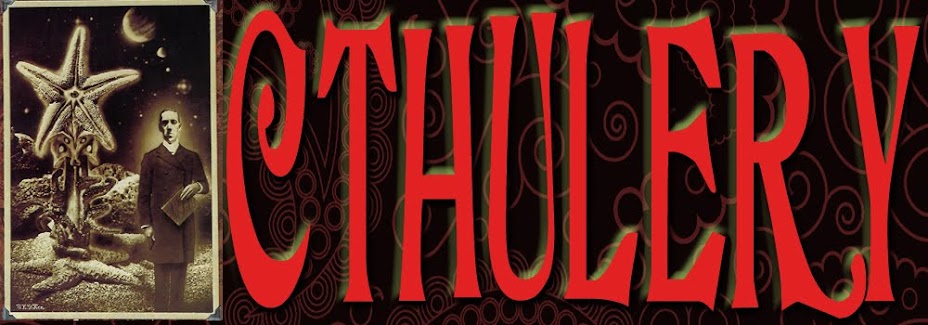by H.P. Lovecraft
 Written c. Nov, 1922
Written c. Nov, 1922Published: Home Brew, Jan-Apr 1923
The tale is narrated by a nameless investigator, who travels to a remote mountain in the Catskills, with two musclemen along, to investigate tales of a monster. They camp in the deserted Martense mansion when a lightning story approaches. All are overcome by drowsiness and fall asleep. When the narrator awakes, he finds his bodyguards gone, and, in a flash of lightning, sees the shadow of a demonic creature.
Next he enlists a reporter, Arthur Munroe, to help in his investigations. They gather as much information as they can on the legends, and soon find themselves trapped in a cabin on the mountain by another storm. Arthur ends up with his face chewed off! (remember I said HPL wasn't afraid to go for the gruesome!)
The narrator digs open the grave of Jan Martense, last of the Martense family, who have a mysterious history. He finds himself in a subterranean burrow. Crawling along, he finds himself confronted by a pair of eyes glowing in the light of his torch. The tunnel caves in, and he is forced to dig his way out. He finds the cabin is being burned to the ground by the local yokels, with a monster trapped inside.
He realizes that the monster, or monsters, are coming up through tunnels under the mansion. He finds a burrow entrance in the basement. During another storm(!), he watches as an army of small, apelike creatures crawl up from the tunnel. He also witnesses them kill and eat one of their own number. He shoots one of them. On close examination, he realizes that these apelike things are the descendants of the Martense family.
The Lurking Fear is a pretty minor story. An early Lovecraft effort, and very pulpy. There isn't much to say about it. There's some nice atmospheric stuff in the first quarter, with the narrator and friends holed up in the deserted mansion. But the denouement is a letdown. It does play on one of Lovecraft's favorite themes - generational decay; whole families falling into such decline that they become un-human. Many people name this one as a favorite, though. Go figure. It's been filmed three times, though I haven't subjected myself to any of them.


